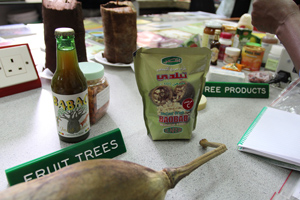Trees & the Private Sector: Carbon credits and baobab powder

In the last installment of videos we filmed at the Nairobi investment forum (Mobilizing Private Investment in Trees and Landscape Restoration in Africa), we focus on two products that have varying market potential: carbon credits and baobab powder.
We spoke to Bo Lager, program director of SCC-Vi Agroforestry in Eastern Africa. He described the benefits of the Kenya Agricultural Carbon Project, a soil carbon project in Western Kenya that expects to work with 60,000 farmer households to change agricultural practices. Reversing soil degradation will help boost crop yields, increase resilience to climate change and help store more carbon in the soil. The focus here is on agriculture -- carbon, he said, is only "the icing on the cake."
(More information on the project's soil carbon methodology and work on strengthening farmer groups on Vimeo.com)
Vi Agroforestry is a non-profit organization backed by private donations from Sweden and funding from the Swedish International Development Cooperation Agency (SIDA), so it can afford to take a long, 20-year view and focus mainly on the project's social benefits. A "hard" investor would likely focus more on the trading commodity resulting from an up-front investment: carbon and fruit could provide long and medium term revenue in that case.
Baobab is not necessarily the first fruit tree that comes to mind when one thinks of potential agrobusiness ventures. Yet the iconic "upside-down tree" is enjoying a marketing push from the likes of Arthur Stevens, also in attendance in Nairobi. He explained the steps taken by Phytotrade, a trade association registered in Botswana, to develop domestic and international markets for a powder derived from the seeds of baobab trees. Although baobab has been used in places like Malawi for years to make drinks and other food products, it is new to the European and North American markets. Traders are hoping it will be recognized for its "superfood" qualities.








